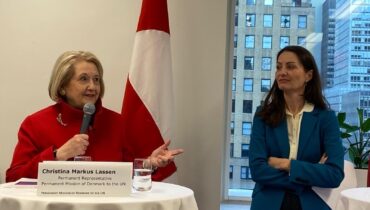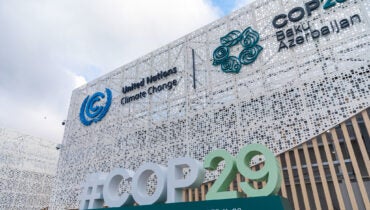We write to urge that gender equality be centered in COP29 – the finance COP – and that women’s leadership be advanced in all climate-related decision-making. The July 2024 meeting of the Heads of Delegation to COP29 in Baku and the September meeting in Bonn present crucial opportunities for the Presidency and the Parties to advance the review of the Lima Work Programme on Gender and its Gender Action Plan (GAP) and to recognize that women’s leadership is integral to progress in all aspects of the UN Framework Convention on Climate Change (UNFCCC) process.
Climate change is an existential threat that disproportionately burdens women and girls. Climatic shifts are creating hostile conditions that entrench inequality, spark conflict, and increase fragility. Over 80 percent of the people currently displaced by climate-related events are women and girls, who face greater difficulties absorbing and recovering from climate shocks. Yet, women receive only two percent of all financial flows addressing the causes and consequences of climate change, and the more fragile a country is, the less climate financing it receives.
Women and girls are often on the frontlines of efforts to address climate change as activists, leaders, community members, and peacebuilders. Nonetheless, the needs and demands of women and girls are often overlooked in multilateral climate processes. In part, this is because they are severely underrepresented in talks, where men are overrepresented and limited opportunity is provided for civil society’s direct participation in negotiations. At COP28, women made up only 34 percent of national delegations and only two percent of delegations had equal representation of women and men.
In June 2024, the Bonn climate negotiations sought to review implementation of the Lima Work Programme GAP, which is the key tool for advancing gender-responsive climate policy and action. The COP29 presidency must give the gender agenda the importance it deserves in the negotiations, in leaders’ events, and across the Action Agenda. A comprehensive, updated, and well-resourced GAP must be adopted at COP30 in Brazil.
We call on all Parties to the Convention to commit to implementing the GAP and gender-responsive financing, to promote gender parity in delegations and negotiating teams, and to nominate and support national gender and climate change focal points (NGCCFP). The marginalization of women in decision-making roles and financing mechanisms is detrimental to progress in addressing the climate crisis. Only through concerted efforts will the global community realize an inclusive, just, and transformative transition to a climate-safe future.
Sincerely,
Helen Clark, Former Prime Minister, New Zealand
Hillary Clinton, 67th United States Secretary of State
Patricia Espinosa, Former Executive Secretary, UNFCCC and Former Foreign Minister of Mexico
María Fernanda Espinosa, Former President of the United Nations General Assembly
Julia Gillard, Former Prime Minister, Australia
Dalia Grybauskaitė, Former President, Lithuania
Carla Koppell, Vice Dean, Edmund A. Walsh School of Foreign Service
Sanna Marin, Former Prime Minister, Finland
Monica McWilliams, Former Member of the Northern Ireland Legislative Assembly
Vjosa Osmani-Sadriu, President, the Republic of Kosovo
Melanne Verveer, Former US Ambassador for Global Women’s Issues and Executive Director, Georgetown Institute for Women, Peace and Security


